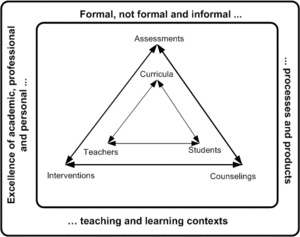Educational psychologist facts for kids
An educational psychologist is a special kind of psychologist. They help students, teachers, and parents in schools and other learning places. Their main jobs include checking how students learn and think, offering advice, and helping with group activities. They also connect people to other experts when needed. In some countries, they work directly with students and families. In others, they focus more on teaching about educational psychology.
Contents
What Educational Psychologists Do
Psychology has many different areas of study. These include health psychology, work psychology, and educational psychology. What makes an educational psychologist unique is their focus on three main groups: teachers, students, and the things they learn (called curricula).
Think of it like a triangle with these three groups at each corner. Today, we know there are many different kinds of students, teachers, and learning plans. An educational psychologist helps these three parts work well together. For example, they can help good teachers work with students who are struggling. They also help students who are doing well, even if their teachers need support. Their goal is to improve learning for everyone.
Educational psychologists work in different settings:
- Microsystems are like family homes. They look at how family life, expectations, and behaviors affect a student's learning.
- Mesosystems are places like schools. They consider how things like where a school is located or the type of teachers and students affect learning.
- Macrosystems are bigger, like whole societies or countries. They look at how a country's education system influences student success. For example, they might study reports like PISA, which compare student performance across countries.
Specific Ways They Help
Educational psychologists have four main ways they help people. These are evaluation, counseling, group help, and connecting people to other experts.
Evaluation
Evaluation means gathering information about students, teachers, and what they learn. This helps them understand how things are going. They look for learning difficulties or problems in the school environment.
- Diagnosis helps find specific issues. This could be learning differences like dyslexia or attention challenges.
- Psycho-educational evaluation looks at problems with schoolwork or issues at home.
Finding these problems early helps with prevention. This means stopping bigger problems from happening later.
Psychological Counseling
Psychological counseling means giving advice and support.
- They help students with their learning, social skills, feelings, and career choices.
- They guide parents on how to support their child's learning at home.
- They offer teachers advice on how to help students with different learning needs.
- They assist school leaders in making decisions. This includes helping students with special needs or deciding if a student should move to the next grade.
Community Interventions
Community interventions are activities that help groups of people.
- If there's a problem, they might do a corrective intervention to fix it.
- To reduce school violence, they might run prevention programs.
- Finding learning difficulties early is a type of prevention.
- They also create programs to prevent future school problems.
- They do optimizing activities to help everyone in the school community. This includes students, teachers, and families. The goal is to improve learning, social skills, and personal growth.
Referral to Other Professionals
The fourth way they help is by connecting people to other experts. If a student needs more specialized help, the educational psychologist will refer them. They work with parents, teachers, and other professionals. This teamwork helps students get the best and fastest support.
Becoming an Educational Psychologist
The training to become an educational psychologist is different in various countries.
In the United Kingdom
In the UK, you usually need a specific Doctoral degree. In Scotland, a Master's degree might be enough. This training teaches them how to do evaluations, counseling, and group interventions. Students also get real-world experience working in schools. They also write a final research paper.
To become an educational psychologist in the UK, you need:
- A first degree in psychology.
- A special Doctorate in Educational Psychology (usually 3 years).
- At least one year of full-time experience working with children. This can be in schools, childcare, or community settings. Some courses might ask for two years of experience.
You must also register with the Health Care Professionals Council (HCPC) to use the title.
In the United States
In the United States, you typically need a bachelor's degree in psychology. Then you need a master's degree, and often a PhD or PsyD in Educational Psychology.
In California, for example, a Licensed Educational Psychologist (LEP) needs:
- At least a master's degree in psychology or a related field.
- Three years of experience. This includes two years as a school psychologist and one year of supervised work.
After meeting these requirements, they take an exam to get their license. These rules are common, but they can vary by state.
Some educational psychologists also work in research. They might work at a university, studying how people learn. They also teach university students in their field.
Job Outlook and Salary
The money an educational psychologist earns can change depending on where they work.
- In a school setting, they might earn around $68,000 per year.
- Those in research and development might earn around $84,000 per year.
In 2010, the average yearly salary was about $72,540. This was higher than the average income in the United States at that time. This means it can be a good career choice.
The job outlook for educational psychologists is good. Experts predict that jobs in this field will grow by about 11% to 15% between 2006 and 2022. This growth rate was considered high compared to many other jobs.
 | Ernest Everett Just |
 | Mary Jackson |
 | Emmett Chappelle |
 | Marie Maynard Daly |


